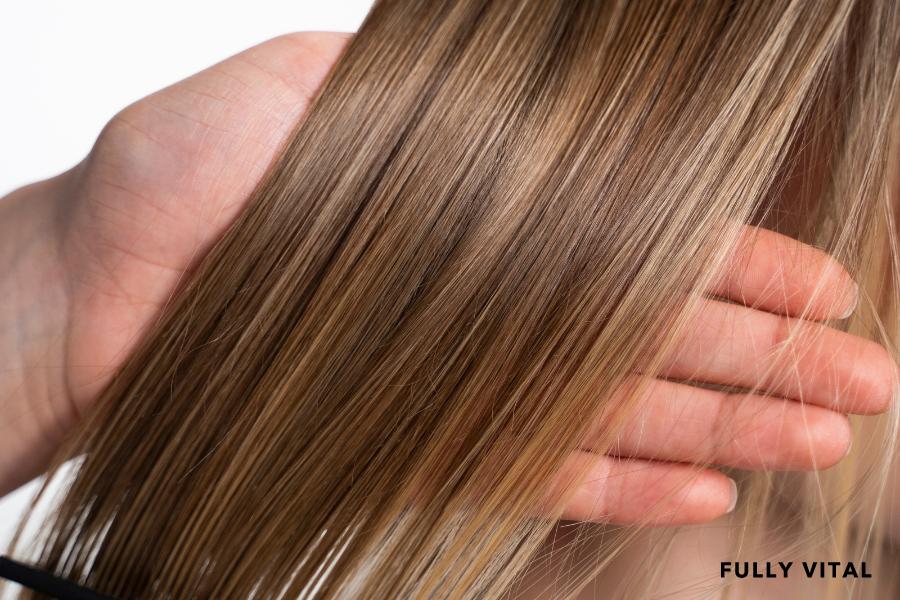
The Difference Between Fine Hair Vs. Thinning Hair
In the quest for luscious locks, understanding the nuances between fine hair and thinning hair is crucial.
As women of diverse hair types seek to stimulate hair growth, it's important to discern the characteristics and disparities between these terms.
This article delves into the intricate world of fine hair versus thinning hair, shedding light on their distinctions and offering insights for maintaining overall hair health.

I LOVE MY HAIR NOW
FullyVital hair serum and hair vitamins made tremendous improvements in my hair. I truly love my hair now.
Dorit S.,
So, let's untangle the web of hair mysteries!
How Do You Know If Your Hair Is Thin Or Fine?
Determining whether your hair is fine or thin involves more than a cursory glance in the mirror.
Fine hair refers to the thickness of individual strands, while thinning hair pertains to the density of your overall hair coverage.1
If you can see your scalp more prominently than before, you might be dealing with thinning hair. However, if your individual strands are delicate and prone to breakage, you likely have fine hair.
Characteristics Of Fine Hair
Fine hair is characterized by its slender individual strands.
These strands often lack volume and can appear limp, even when freshly washed.
Fine hair individuals might find it challenging to hold certain hairstyles due to the lack of natural texture.
Despite its delicacy, fine hair can shine brilliantly with the right care and attention.2
Delicate Strands
Fine hair strands are notably thinner in diameter.
Lack Of Volume
Fine hair tends to look flat and lacks the bounce associated with thicker hair.
Prone To Breakage
Due to its fragility, fine hair is more susceptible to breakage and split ends.

Characteristics Of Thin Hair
Thinning hair, on the other hand, refers to a decrease in the overall number of hair follicles.
This can lead to wider areas of scalp visibility and a less dense appearance.
Thin hair can affect people of any hair type and ethnicity, making it a concern that transcends across the board.3
Reduced Density
Thin hair is characterized by a decrease in the number of hair follicles.
Scalp Visibility
Thinning hair can result in more noticeable areas of the scalp.
Hair Loss Concerns
Thin hair is often associated with hair loss issues.
Fine Hair Vs. Thin Hair: Key Differences
While fine hair and thinning hair might seem interchangeable, they have distinct differences that set them apart.
-
Texture vs. Density: Fine hair refers to the texture of individual strands, while thinning hair relates to the overall density of hair coverage.
-
Genetics and Aging: Fine hair can be genetic, while thinning hair is often attributed to factors like age and hormonal changes.
-
Styling Challenges: Fine hair individuals struggle with volume and styling, whereas thinning hair individuals deal with concerns of hair loss and scalp visibility.
Factors Influencing Fine And Thin Hair
Several factors influence the development of fine and thinning hair, including:
Genetics
Your family history plays a significant role in determining your hair's thickness and density.
Hormones
Hormonal changes, such as those during pregnancy or menopause, can impact hair texture and density.
Age
As you age, hair strands may become finer, and overall hair density can decrease.
Stress
Chronic stress can contribute to hair loss and thinning.
Hair Care Habits
Excessive heat styling and harsh chemicals can weaken hair, making it appear finer or contributing to thinning.

Tips For Overall Hair Health
Maintaining healthy hair goes beyond identifying whether your hair is fine or thinning.
Regardless of your hair type, these tips can help boost your hair health:
Nourishing Diet
Consume a balanced diet rich in vitamins, minerals, and protein for optimal hair growth.
Gentle Styling
Minimize heat styling and use protective products when styling.
Regular Trims
Trim your hair regularly to prevent split ends and breakage.
Scalp Care
Keep your scalp clean and moisturized to support a healthy environment for hair growth.
Avoid Tight Hairstyles
Tight hairstyles can stress hair strands and contribute to breakage.
What Is Fine Hair?
Fine hair refers to individual hair strands with a smaller diameter, giving them a delicate and lightweight texture.
These strands may appear wispy and are more prone to breakage due to their fragile nature.
Despite their subtlety, fine hair can possess a natural sheen that adds an elegant touch to your overall look.
How Does Fine Hair Work?
Fine hair strands are finely textured, which means they have a smaller cross-sectional diameter compared to thicker hair strands.
This characteristic influences how fine hair interacts with light, often resulting in a shiny appearance.
Fine hair tends to lay flatter against the scalp, which can make it appear less voluminous.
Benefits of Fine Hair
Natural Shine
Fine hair's smooth texture reflects light, enhancing its shine and luminosity.
Versatile Styles
Due to its lightweight nature, fine hair can be easier to style and manipulate into various looks.
Elegance
Fine hair exudes an air of elegance and refinement, especially when well-maintained.
Why Is Fine Hair Important?
Fine hair adds a touch of grace and subtlety to your overall appearance.
It's natural shine and delicate texture contribute to a unique charm that can be accentuated with the right care and styling.
Recognizing the value of fine hair allows you to embrace its characteristics and make the most of your hair care routine.
What Is Thin Hair?
Thin hair pertains to a lower density of hair follicles, leading to reduced coverage on the scalp.
This can result in areas of the scalp becoming more visible. Thin hair can affect individuals of various hair types and backgrounds, and it often requires specific care to maintain its health and appearance.
How Does Thin Hair Work?
Thin hair occurs when there are fewer hair follicles per square inch of the scalp.
This can be due to genetics, hormonal changes, or other factors.
As a result, individual hair strands might appear sparser, and the scalp might be more noticeable, especially in certain lighting conditions.
Benefits Of Thin Hair
Effortless Styling
Thin hair is generally lighter and easier to manage, making styling less time-consuming.
Airy Texture
Thin hair can have an airy and light texture that lends itself well to certain hairstyles.
Adaptability
Thin hair can be styled in a variety of ways, from sleek to voluminous, with relatively less effort.
Why Is Thin Hair Important?
Thin hair showcases a unique kind of beauty characterized by its lightweight and airy texture.
While it might require specialized care, thin hair offers versatility in styling and can be adapted to suit various looks.
Understanding the significance of thin hair empowers you to tailor your hair care routine to its specific needs.
Alternatives To Fine Hair And Thin Hair
While fine hair and thin hair each possess their own distinctive qualities, there are alternatives for those seeking a different hair experience:
Alternatives To Fine Hair
-
Coarse Hair: Coarse hair features thicker individual strands, providing a fuller and more robust appearance.
-
Medium Hair: Medium hair strikes a balance between fine and coarse, offering versatility in styling.
Alternatives To Thin Hair
-
Thick Hair: Thick hair boasts a higher density of hair follicles, resulting in a lush and voluminous look.
-
Medium Density Hair: Hair with medium density strikes a balance between thin and thick, providing manageability and styling options.
Unlock Radiant Hair With FullyVitalExperience the transformational power of science-backed hair growth products from FullyVital. Our mission is simple: to help you slow down and reverse the aging of your hair, fostering a healthier relationship with your locks. Here's how our products can elevate your hair care journey:
Elevate your hair care routine with FullyVital – where healthy, beautiful hair is a journey we embark on together. |
Final Thoughts On Fine Hair Vs. Thin Hair
As we delve into the intricate world of fine hair vs. thinning hair, one truth becomes abundantly clear: every strand tells a story. The distinctions between fine hair and thinning hair are not mere semantics; they embody the diverse beauty that defines us all.
From the delicate allure of fine hair to the airy elegance of thin hair, each hair type is a testament to individuality.
We've explored the characteristics, significance, and even the history of these hair types, highlighting the strides made in the beauty industry to celebrate diversity.
In a world where beauty standards continue to evolve, embracing the authenticity of your hair type is a powerful act of self-expression.
FullyVital, your partner in nurturing healthy locks, understands the journey you're on.
Our range of hair growth products is designed to accompany you on this path, offering solutions that halt the aging of your hair and restore its vitality.
Because your hair deserves the same level of care and attention as the rest of you.
Frequently Asked Questions About Fine Hair Vs. Thin Hair
Can fine hair become thin over time?
Yes, fine hair can appear thinner as individual strands weaken and break over time.
Is thinning hair reversible?
In some cases, thinning hair can be treated and its progression reversed.
Consult a hair care professional for personalized advice.
Are there products specifically designed for fine or thinning hair?
Yes, many hair care products cater to fine or thinning hair, offering volumizing and strengthening benefits.
Can coloring or dyeing hair affect its thickness?
Excessive coloring or chemical treatments can lead to hair damage and potential thinning.
Use such treatments sparingly.
Are there hairstyles that work best for fine hair?
Hairstyles with layers and textured cuts can add volume and dimension to fine hair.
Does stress play a role in thinning hair?
Yes, chronic stress can contribute to hair loss and thinning by disrupting the hair growth cycle.
Can certain medications cause thinning hair?
Yes, certain medications and medical treatments can lead to hair thinning as a side effect.
Consult your healthcare provider for more information.
Are there any natural remedies for promoting hair growth?
While there's no guaranteed natural remedy, some people find benefits from using ingredients like castor oil, aloe vera, and essential oils. Results can vary.
Is hair loss the same as thinning hair?
Hair loss refers to the shedding or falling out of hair, which can contribute to thinning hair over time.
Thinning hair encompasses a broader reduction in hair density.
Can hormonal imbalances cause both fine and thinning hair?
Yes, hormonal imbalances can impact both hair texture and density, leading to fine hair and thinning hair concerns.
Sources:
-
Thin Hair: How to Identify It and Care For Dainty Strands. (2022, May 24). F.Y.I. | by Function of Beauty. https://www.functionofbeauty.com/blog/lightreads/thin-hair/
-
Everything You Need to Know About Fine Hair. (n.d.). It’s a 10. https://itsa10haircare.com/blogs/hair-guides/fine-hair-guide
-
My hair is so thin I can see my scalp! Why & What to do. (n.d.). EndaringHair. Retrieved August 10, 2023, from https://www.endaringhair.com/blogs/all-blogs/my-hair-is-so-thin-i-can-see-my-scalp







